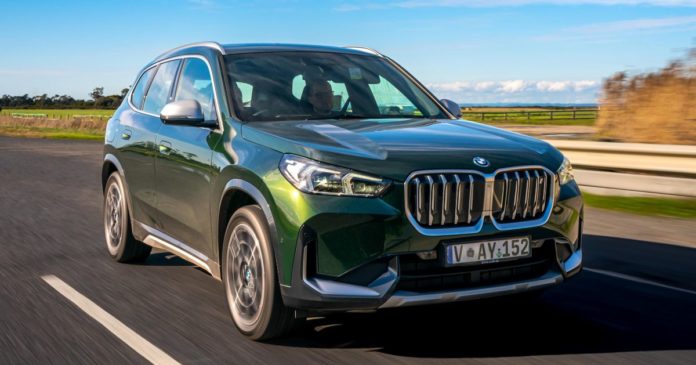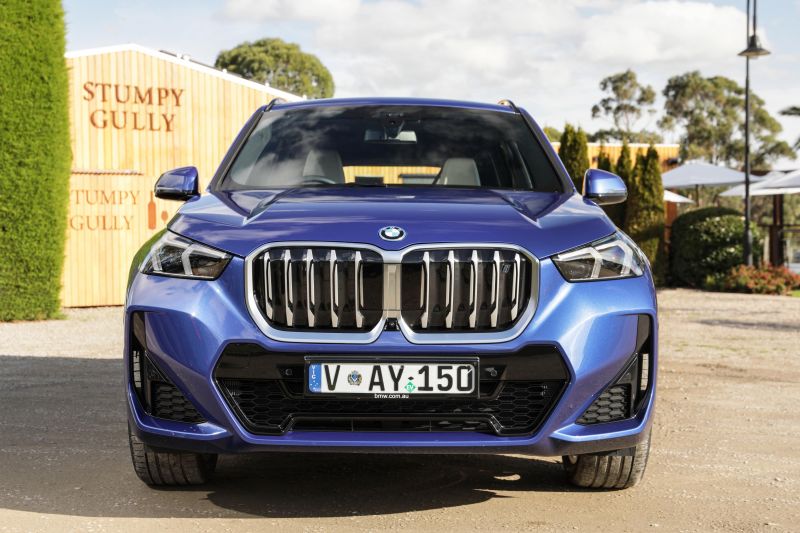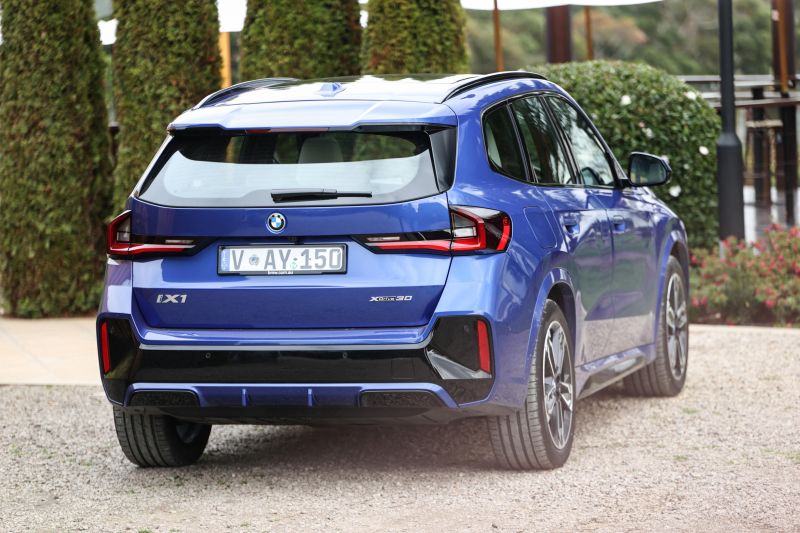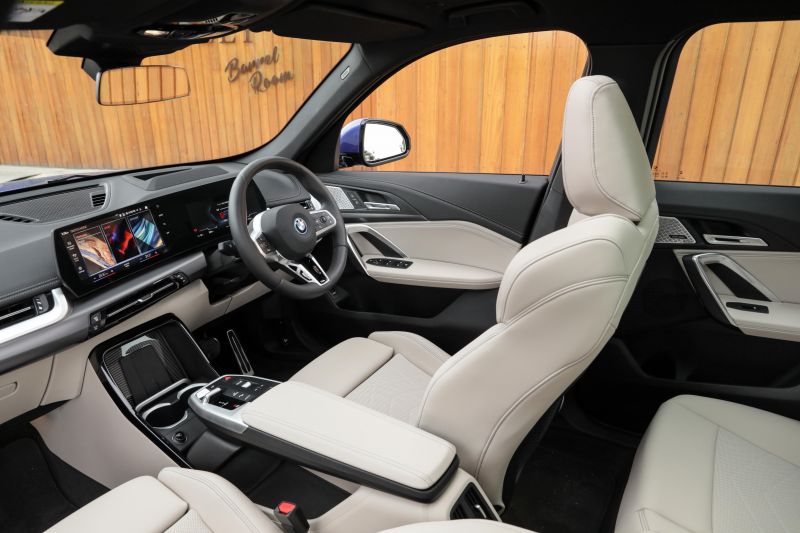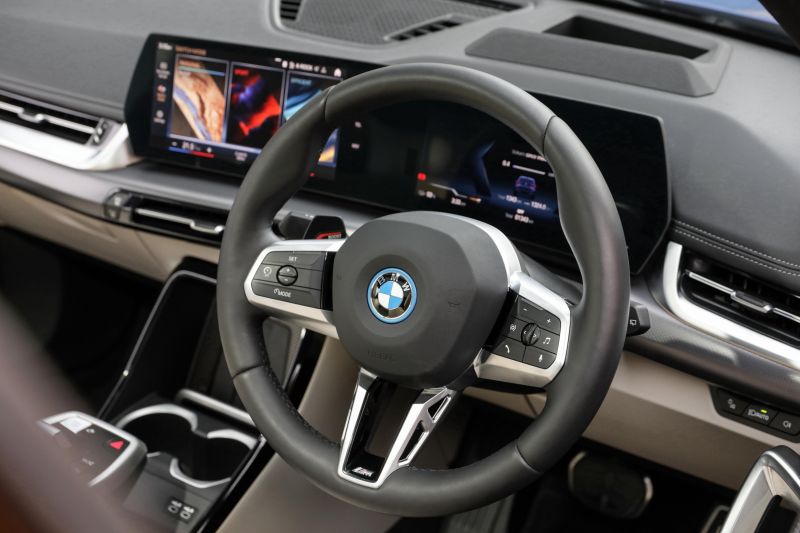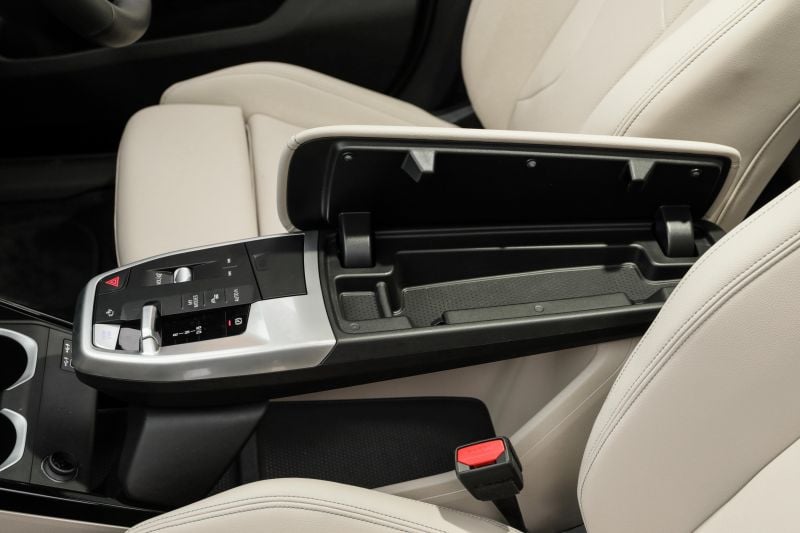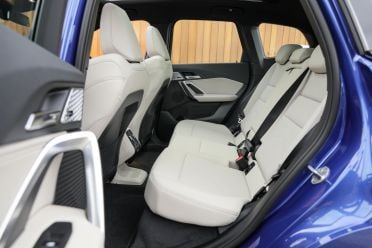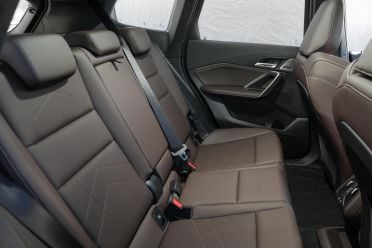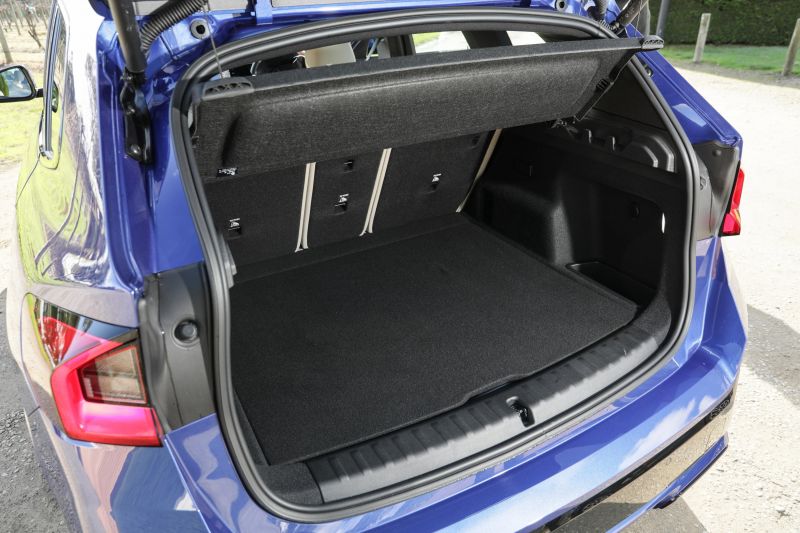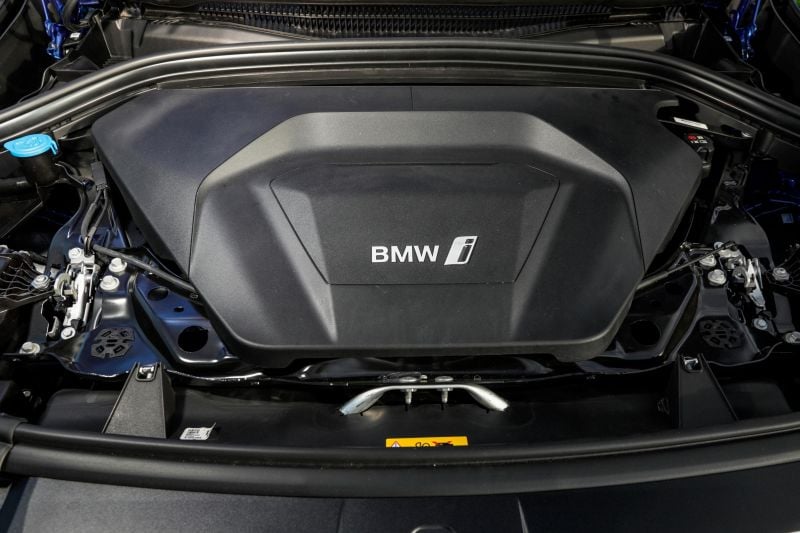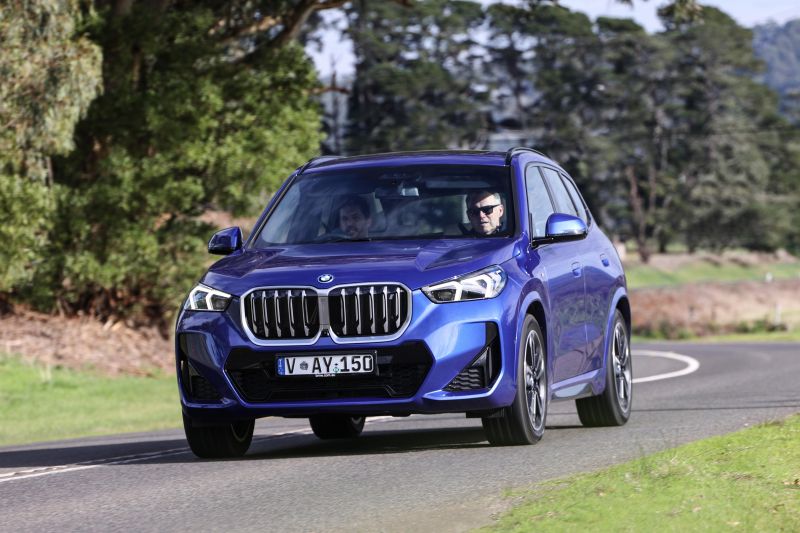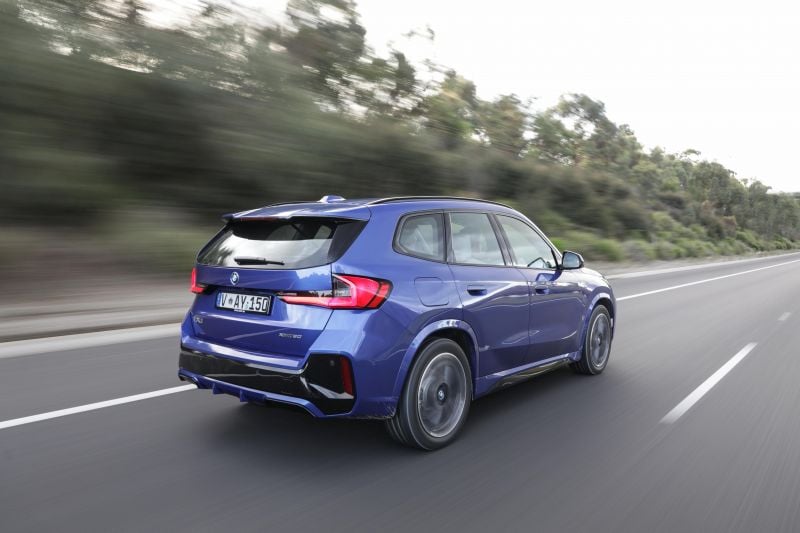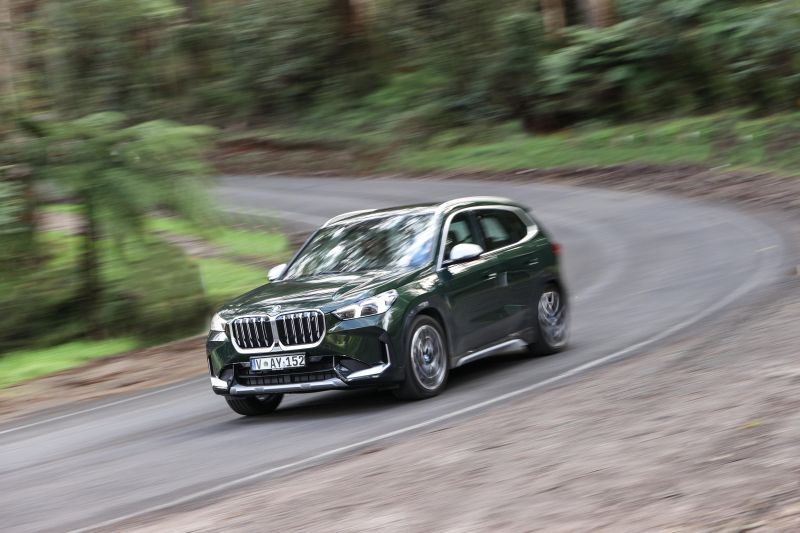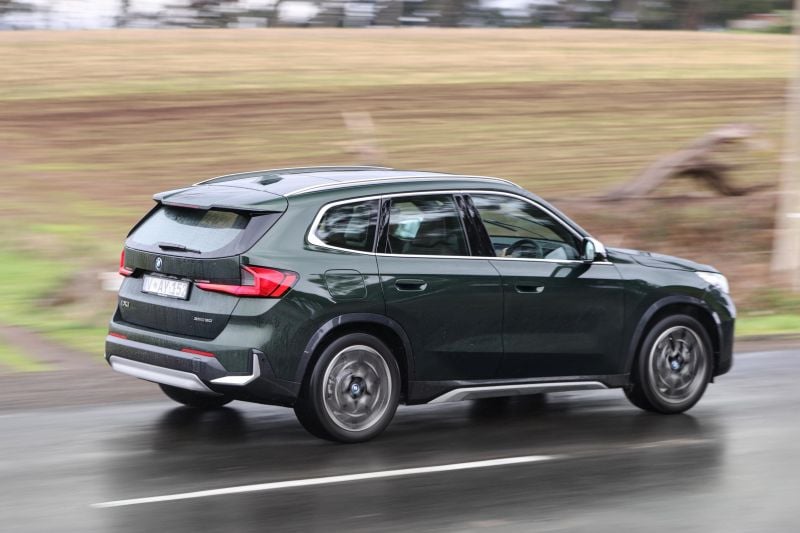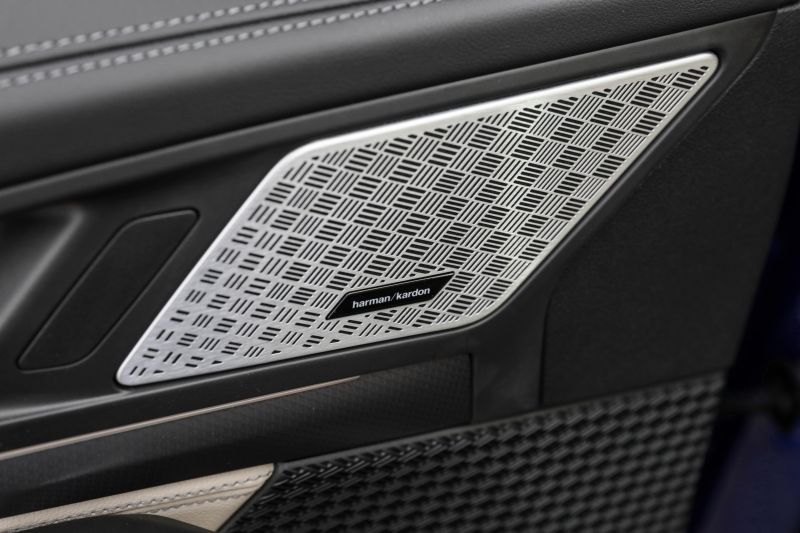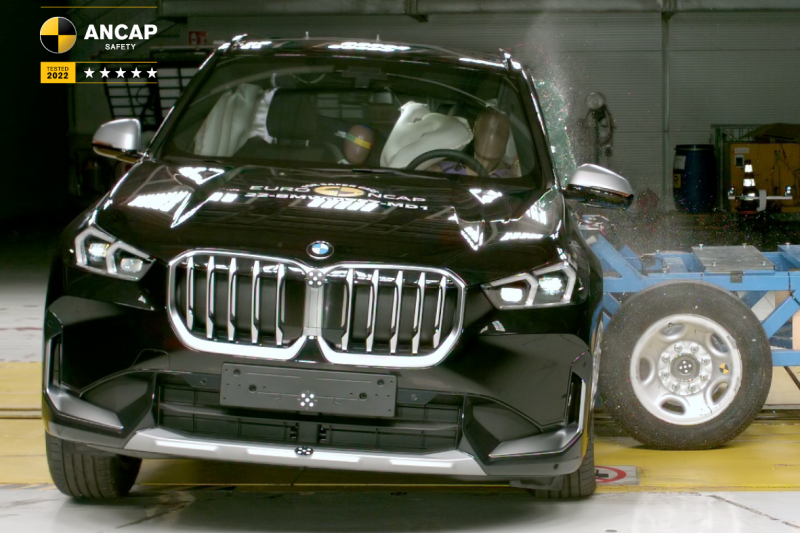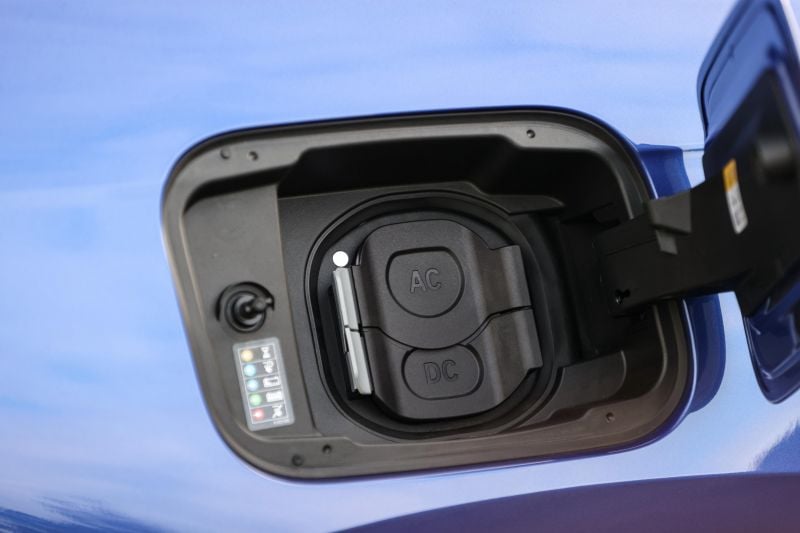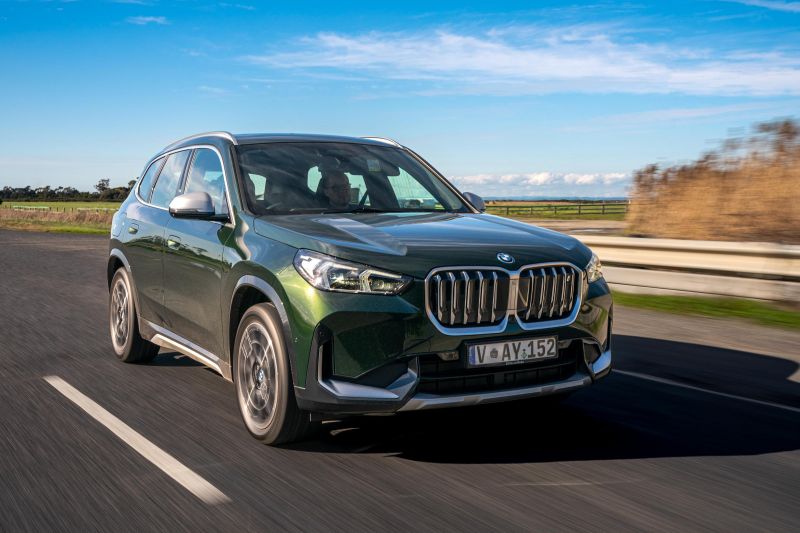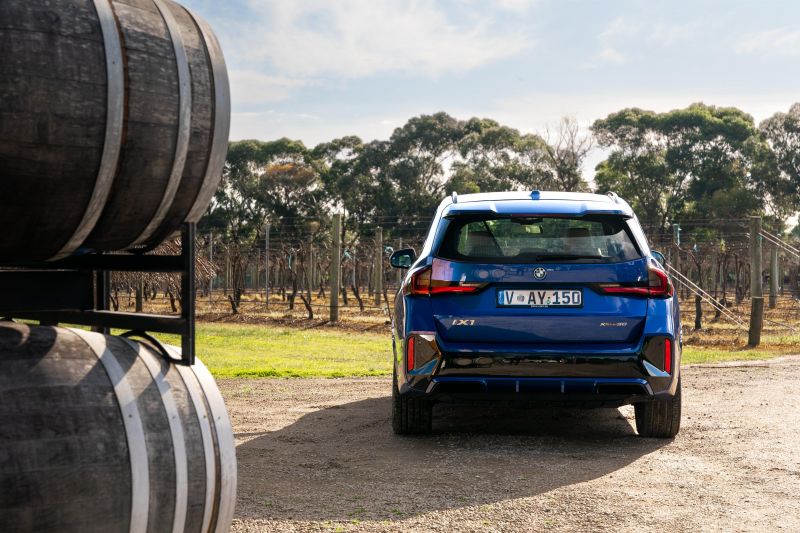The BMW iX1 has finally arrived in Australia.
Based on the new-generation X1 crossover, the new electric SUV is an answer to the Mercedes-Benz EQA and Volvo XC40 Recharge – Audi has the Q4 e-tron in other markets but it isn’t here yet.
Like the larger iX3, the iX1 aims to offer EV ownership in a familiar package. While some brands are bringing electric cars that push the envelope, the iX1 looks and feels very much like any other X1.
The iX1 has a beefy dual-motor electric drive system with 230kW/494Nm on tap, making it the most powerful X1 variant currently on sale in Australia – at least until the 233kW/400Nm X1 M35i lobs later this year.
Price-wise it’s line-ball with the Volvo XC40 Recharge Twin – though the Volvo has more power, performance and range – but it’s well under the asking price of the equivalent Mercedes-Benz EQA 350 4Matic ($102,579).
Given electric car buyers aren’t always swayed by brands the same way traditional buyers might be, you can also see the iX1 being cross-shopped with the likes of the Tesla Model Y, Hyundai Ioniq 5 and Kia EV6.
Should this little premium SUV be on your shortlist?
How much does the BMW iX1 xDrive30 cost?
BMW Australia opened orders late last year at $82,900 before on-road costs, but the price has since been bumped to $84,900 before on-roads.
The xLine and M Sport versions are no-cost options, meaning you can have a more rugged SUV-looking iX1 or a sportier vibe without having to pay extra for either styling package.
However, the pricing adjustment following the ‘introductory offer’ also came with some spec adjustments, meaning you now have to pay for things like premium paint and a premium sound system – more on that further down.
In terms of rivals, the updated Volvo XC40 Recharge Twin is priced from $85,990 before on-road costs, with more power (300kW/660Nm v 230kW/494Nm) and more range (500km v 400km) than its German competitor.
The Mercedes-Benz EQA 350 4Matic is priced from $102,579 before on-road costs, offering 215kW and 520Nm from its dual-motor drive system. The Mercedes is slower than the BMW and quotes a similar 400km of range.
Beyond the iX1’s traditional competitors, equivalent electric cars from other brands include the Tesla Model Y Long Range ($78,400), Hyundai Ioniq 5 Epiq AWD ($85,000), and Kia EV6 GT-Line AWD ($87,590).
Note that these other alternatives are physically larger vehicles than the BMW, offering similar levels of performance and features.
What is the BMW iX1 xDrive30 like on the inside?
If you’ve sat in the latest X1, it’s sorta just like that.
The iX1 is a segment leader for perceived quality, tactility and practicality. The BMW Curved Display incorporates a 10.25-inch digital instrument cluster and a 10.7-inch curved touchscreen, both running BMW’s latest iDrive 8.0 operating system.
It’s also one of the first times we’ve seen the traditional iDrive rotary controller removed from the centre console; instead BMW makes you use touch inputs or voice prompts via the BMW Intelligent Personal Assistant.
Overall there’s very little difference in the user experience here to the standard X1, with high-resolution graphics, snappy load times, and a full feature suite all at your fingertips.
The curved touchscreen is angled at the driver for better ergonomics, and simple tasks are easy enough without the iDrive controller.
The iX1 features everything you’d expect, including wireless Apple CarPlay and Android Auto, satellite navigation with augmented view and real-time traffic information (incl. three years of map updates), DAB+ radio as well as a suite of BMW ConnectedDrive Services via an on-board eSIM, which comes with a three-year subscription.
With that said, the complexity of the various menus means there’s an extra step or two to get to certain settings and functions with the removal of the controller and switchgear, which is a step back compared to OS7.0.
Perhaps my biggest annoyance is the removal of the distance control button on the steering wheel for the adaptive cruise control – it’s now embedded in the driver assist menus within the touchscreen. WHY?!
I’m also not quite sold on the layout of the eigth-gen iDrive’s take on a digital instrument cluster.
Call me old fashioned, but while having new-age skins is cool for some, I like the option of more conventional power meters and speedo dials.
BMW used to make some of the clearest and most attractive analogue dials, so it’s a shame the company has basically thrown conventional gauges out the window in the digitised age. Audi is still the benchmark.
One cool party trick, however, is the fact Apple CarPlay will project Maps into the cluster when in use, meaning unlike some older digital binnacles you don’t sacrifice mapping functionality by using third-party software. Props to BMW for this excellent integration.
You also get a nice clear head-up display projected onto the windscreen, which can show you more information than you probably need.
As with the standard X1, there’s heaps of storage about in this open plan, airy cabin.
There’s a cubby underneath the front-centre armrest, and the floating design of the centre console means there’s a larger cubby underneath for larger items.
Ahead of the console with its stubby shift-by-wire toggle selector are two larger cupholders, then an upright holder for your phone with a wireless charging pad.
Perhaps my favourite part of this design is not the fact the phone is upright and facing you in the correct orientation – not that you should be looking at your phone behind the wheel – but the fact there’s a little weighted harness that clips in and holds it firmly in place like a rollercoaster.
Other than that, our test car’s Enhancement Package ($4700) brings a panoramic sunroof, a solid harman/kardon premium sound system, and Active Sports seats featuring powered lumbar and massaging up front – it’s a shame you have to pay for the roof and the audio system, but they’re worthwhile features to have in a premium vehicle.
The second row of the iX1 remains a strong point, even if it’s not quite up to par with the segment-leading Volvo XC40.
Head, knee and leg room are all still good despite the electrified underpinnings, but you will notice a slightly raised cabin floor due to the batteries housed underneath.
So, for someone like me at 6’1 and longer legs than torso, you might feel a little knees up which can impact long-distance comfort. It’s easily more comfortable back there than the EQA, however.
Otherwise it’s all standard X1 fare. Directional air vents and USB-C power outlets are mounted at the rear of the centre console, there are map pockets behind the front seats as well as a fold-down centre armrest with cup holders.
Outboard ISOFIX and top-tether points across all three positions means the iX1 is well equipped for dealing with kids, and the fact BMW has shrink the centre tunnel means you don’t have a huge protrusion into the centre of the footwell should you need to carry three across.
Behind the second row, the iX1 quotes luggage capacity of 490L with the rear seats in place, and 1495L with them folded – 40:20:40 for those asking.
That’s about 50L and 100L off the standard X1 in each measurement, although you retain a pretty solid figure regardless.
There’s a handy under-floor compartment to stow your cables, and when the rear seats are folded the floor remains pretty darn flat with minimal load lip. As with the regular X1, there’s a tyre repair kit instead of a space saver spare.
What’s under the bonnet?
At launch the sole iX1 variant available is the xDrive30, which runs a dual-motor AWD electric drivetrain.
Up to 230kW in combined power is available, with 494Nm on tap from the moment you press the throttle pedal. BMW claims a 5.6-second dash from 0-100km/h, while top speed is limited to 180km/h.
The iX1 is fitted with a relatively small 67kWh (64.7kWh usable) lithium-ion battery pack, quoting 400km of range on the ADR cycle, which is based on more lenient NEDC regime. It’s equivalent to a claimed 18.3kWh/100km on the combined cycle. Globally, BMW quotes up to 440km on the WLTP cycle depending on specification.
As for charging, the iX1 can be hooked up to a DC charger at up to 130kW, which will see the battery replenished from 10 to 80 per cent in as little as 29 minutes.
BMW has also opted for the 22kW on-board AC charger as standard. It means you can use the full capability of the available 22kW AC wall box accessory available through BMW Australia.
Mode 2 and Mode 3 cables are included with purchase, and BMW also throws in a complimentary three-year subscription to the Chargefox public charger network.
How does the BMW iX1 xDrive30 drive?
The X1 sDrive18i I recently reviewed was already impressive, but this iX1 drives like a much more expensive car.
Having so much power on tap means the iX1 is an effortless and muscular performer depending on the situation and what you ask of it, and the lack of combustion engine noise makes for a pretty serene experience.
To fill in that void, BMW has added its Iconic Sounds Electric program with synthesised powertrain noise created by legendary composer Hans Zimmer, and the futuristic notes can take a little getting used to at first.
In fact, one of my friends who is equally fascinated and terrified every time I drive her in something new, immediately reacted with “is it supposed to sound like it’s a spaceship taking off” once we hit the road. She was quite impressed with the Hans Zimmer reference once I explained it to her…
Anyway, whether you’re in town or on the highway, the iX1 offers strong performance not far off the likes of hot hatches – after all, it’s barely half a second off the M135i xDrive in the 0-100 sprint.
I was most impressed with the calibration of the throttle as well as the B mode on the gear selector which activates a one-pedal driving mode.
BMW has done an excellent job at making throttle response and regenerative braking linear and responsive to small adjustments on the pedal. It felt really intuitive and connected to what my intentions were.
Give it a boot and it will snap your neck and throw you into your seat, and that’s not even using Sport mode.
The full 230kW comes in as an overboost function when you give the iX1 full throttle, with the regular power output sitting closer to the 200kW mark.
In models with the M Sport package, you can activate this max power mode by holding the left paddle until you’re notified the overboost function is active, which is available for around 10 seconds at a time.
With that extra grunt, the iX1 does well to mask its 400kg weight disadvantage compared to the X1 xDrive20i.
Despite this little SUV weighing at a smidgen over 2.0 tonnes, the chassis feels well balanced and responsive in corners, a core part of BMW’s DNA.
There’s a real hunkered-down feel at speed in a straight line and when you’re threading the iX1 through bends, but there’s also a bit more heft shifting from side-to-side. It also rides well, with the Adaptive M suspension striking a great balance between compliance, handling and body control.
A complaint of Paul Maric’s was the steering, which doesn’t feel quite as dialled in as the chassis. There’s a vagueness about centre which can feel a little loose, though there’s a quickness in response as you dial in more lock that means the iX1 responds nicely to inputs even if you’re not getting a heap of feedback.
Grip is plentiful with the electrified xDrive all-wheel drive system, which inspires confidence in all weather and road conditions.
While powertrain noise is minimal, there is a bit of tyre roar at speed on anything other than perfectly smooth bitumen, which is typical of entry-level premium vehicles. That said, an $85,000 luxury-badged car should be quieter at speed.
BMW fits its full suite of driver assistance systems as standard to the iX1, meaning you get everything from the Steering and Lane Control Assistant to surround cameras as well as blind-spot and front/rear cross-traffic assists.
The Steering and Lane Control Assistant is one of my favourite highway assists available right now, with BMW calibrating a near-perfect balance between assisted steering input and user-friendliness. It accurately keeps you centred in your lane and a set distance from leading vehicles without feeling overzealous or overly conservative.
Having high-quality surround cameras makes parking a cinch, as does the active parking guide and surround sensor array. The Drive Recorder function also can do whatever parking manoeuvre you’ve performed in reverse to help you leave a particularly tricky space without dinging or scraping the iX1 or its big alloy wheels.
What do you get?
iX1 xDrive30 xLine highlights:
- Adaptive LED headlights
- High-Beam Assist
- xLine styling
- 19-inch alloys
- Aluminium satinated roof rails
- xLine bumpers
- Pearl Chrome exterior accents
- Adaptive M suspension
- M-specific steering function
- Mirror Package
- Auto anti-dazzle mirrors
- Auto fold-in function
- Auto parking function, passenger side
- Dual-zone climate control
- Automatic tailgate
- Comfort access
- Floor mats in velour
- 40:20:40 split rear seats
- M headliner, anthracite
- Veganza upholstery (July 2023 production)
- Sports seats
- Seat heating, front
- Electric seats incl. driver memory
- Sport leather steering wheel
- Preparation for heated steering wheel***
- Instrument panel in Sensatec leatherette
- Storage compartment package
- 12V sockets in rear centre console, cargo area
- BMW Live Cockpit Professional
- 10.25-inch instrument display
- 10.7-inch HD curved touchscreen
- Satellite navigation with augmented view**
- Wireless Apple CarPlay
- Wireless Android Auto
- Personal Profile
- DAB+ radio
- 6-speaker audio system, 100W
- 2 x USB-C ports (front), 2 x USB-C ports (rear)
- Wireless smartphone charger
- Connected Package Professional*
- Remote Services
- Real Time Traffic Information
- Concierge Services
- Intelligent Emergency Call
- BMW TeleServices
- Vehicle apps (e.g. News, Weather)*
- BMW Intelligent Personal Assistant*
- Remote Software Update*
*3-year subscription
**3-year subscription to map updates
***Available via digital subscription
iX1 xDrive30 M Sport highlights:
- M Sport styling
- 19-inch M light-alloy wheels
- M-specific grille in satinated aluminium
- M-specific bumpers, vehicle colour
- Black high-gloss accents
- M badging
- Mirror caps in body colour
- M Roof Rails in High-Gloss Shadow Line
- Alcantara/Veganza upholstery
- Black with blue contrast stitching
- M Aluminium Hexacube Pale interior trim (July 2023 production)
- M leather steering wheel
Note: Veganza upholstery replaces Sensatec from July 2023 production. BMW says it’s essentially the same being a leatherette material with unchanged trims and graphics, though it’s claimed to be slightly softer in feel.
Options
Enhancement Package: $3616
- Metallic paint
- Active Sport front seats
- Power lumbar
- Massage function
- 12-speaker Harman/Kardon audio
- Panoramic glass sunroof
BMW i Blue design accents: $NCO
- Design accents in BMW i Blue
- Kidney grille inner highlight
- Front air curtain highlights
- Side sill curtain highlights
- Rear bumper inserts
Wheels
- 20-inch BMW Individual light alloy wheels, Multispoke style 869: $1539
Upholstery
- Sensatec in Black, Oyster, Mocha: $NCO
- Alcantara-Sensatec combination, blue contrast stitching (M Sport)
Interior trims
- Eucalyptus open-pore wood OR aluminium ‘Mesheffect’: $NCO
- Aluminium Hexacube dark (M Sport)
Colours
Non-Metallic
Metallic ($1385)
- Mineral White
- Space Silver
- Black Sapphire
- Phytonic Blue
- Cape York Green
- Sanremo Green
- Utah Orange
- M Portimao Blue
BMW Individual Metallic ($1923)
Is the BMW iX1 xDrive30 safe?
The combustion-powered X1 range wears a five-star ANCAP and Euro NCAP safety rating, but the iX1 remains unrated.
The X1 scored 86 per cent for adult occupant protection, 88 per cent for child occupant protection, 76 per cent for vulnerable road users, and an impressive 94 per cent for safety assist.
While ANCAP noted ‘respectable’ performance in all four key areas of assessment, the crash tester noted the BMW noted Weak performance for protection of the driver’s chest in the frontal offset test, and Marginal protection of the rear passenger’s test in the full-width test.
AEB performance was rated Good, though ANCAP noted the X1’s system doesn’t detect pedestrians in reverse.
Standard safety features include:
- 7 airbags incl. front-centre airbag
- Acoustic protection for pedestrians
- Autonomous emergency braking (AEB)
- City, Interurban speeds
- Car-to-Car
- Pedestrian, Cyclist detection
- Junction assist
- AEB reverse
- Adaptive cruise control incl. stop/go
- Blind-spot monitoring
- Forward collision warning
- Front cross-traffic assist
- High-Beam Assist
- Lane change warning (blind-spot)
- Lane departure warning
- Parking sensors front, rear
- Rear cross-traffic assist
- Reversing Assistant
- Steering and Lane Control Assistant
- Adaptive cruise + lane centring
- Surround View (360 cameras)
How much does the BMW iX1 xDrive30 cost to run?
Like the wider range, the BMW iX1 is covered by a five-year, unlimited-kilometre factory warranty.
Further, the high-voltage components are warranted for eight years or 160,000km – whichever comes first.
BMW offers Service Inclusive packages covering four years or six years, in both Basic and Plus tiers.
For the iX1, the Basic Package is $1263 for four years and $1800 for six. The Plus package, which also includes the renewal of brake pads and discs as well as wiper blades, is $5219 for four years and $6240 for six.
As noted earlier, you get a three-year Chargefox subscription with purchase, giving you access to Australia’s largest EV public charger network.
Following our week of testing, the iX1 was showing an indicated energy consumption of 20.6kWh per 100km, indicating a real-world range of under 350km.
Our 600km of driving was largely skewed to highway driving in very cold Melbourne conditions, which are both elements which would hurt an electric vehicle’s efficiency.
CarExpert’s Take on the BMW iX1 xDrive30
The iX1 is a good example of making a combustion model all-electric with minimal compromise.
Having been designed from the beginning with an electric powertrain in mind, the iX1 retains the bulk of its X1 counterpart’s attributes in offering a resolved drive, good handling, and a premium cabin with solid space for the segment – even if the latter is a tad impeded by the all-electric hardware underneath.
Performance and driveability are also strong points, if not quite as strong as the XC40 Recharge Twin, and its 400km official combined range is a little lacking when many rivals are now consistently hitting the 450-500km mark.
It’s also disappointing that BMW Australia raised pricing and took features out after order books initially opened, meaning you’re looking at closer to $90,000 before on-road costs if you want an iX1 with all the fruit.
For many, the iX1’s strongest characteristic is the fact it looks and feels just like a regular X1. In a world where most manufacturers continue to give EVs wacky designs and futuristic quirks to appeal to early adopters, the iX1 will likely find wider appeal thanks to its understated and inoffensive approach to design and function.
If you’re looking for a more familiar way to step into full electrification and can live with a driving range that’s merely average in the real world, the iX1 is a solid contender in this part of the market.
Click the images for the full gallery
MORE: Everything BMW iX1

